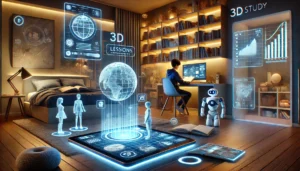“Is AI the Future of Homework? How Technology is Changing Education”
Is AI the Future of Homework? How Technology is Changing Education
Artificial intelligence (AI) is transforming many aspects of modern life, and education is no exception. From automating repetitive tasks to enabling personalized learning experiences, AI is becoming an essential part of classrooms and beyond. But how is this technology influencing homework and reshaping education? Let’s explore the role AI is playing in this exciting evolution.
Personalized Learning Tailored to Every Student
One of AI’s most remarkable contributions to education is its ability to deliver personalized learning experiences. Every student learns differently, and traditional methods often fall short of addressing these differences. AI-powered tools analyze individual strengths, weaknesses, and preferences to create custom lesson plans.
Platforms like Khan Academy and Duolingo use AI algorithms to adjust difficulty levels, recommend exercises, and provide real-time feedback. This ensures learners stay engaged and progress at their own pace. Homework, which was once a standardized activity, is now becoming a tailored experience designed to meet each student’s unique needs.
Instant Feedback for Better Learning
One of the biggest challenges students face with homework is waiting for feedback. Traditional systems often involve educators manually reviewing and grading assignments, leading to delays in understanding and improvement. AI eliminates this issue by providing immediate feedback.
Tools like Grammarly and Mathway evaluate submissions and offer corrections or suggestions instantly. This immediate response helps students identify and fix mistakes on the spot, strengthening their understanding and encouraging improvement. For educators, these tools reduce grading workloads, allowing more focus on teaching and mentorship.
Closing the Education Gap
Access to quality education is a challenge in many parts of the world. AI is addressing this issue by providing scalable and cost-effective resources. Virtual tutors, for instance, guide students through complex topics without requiring constant human supervision.
Applications like Google’s Socratic break down challenging problems into manageable steps. These tools also offer explanations and resources in multiple languages, making education more inclusive. With these advancements, homework becomes an opportunity for students everywhere to explore and grow, regardless of geographic or economic barriers.
Encouraging Independent Learning
AI empowers students to take ownership of their education. Tools with adaptive learning technology identify knowledge gaps and suggest specific ways to improve. This fosters a sense of responsibility and independence in students.
Many AI-driven platforms use gamification to make learning more engaging. By earning rewards or unlocking achievements, students stay motivated to complete tasks. Homework, once seen as a chore, is now an interactive and enjoyable process that encourages self-driven growth.
Addressing Challenges and Ethical Concerns
While AI offers many benefits, it also raises some concerns. One issue is over-reliance on technology. If students rely too much on AI tools, they may struggle to develop critical thinking and problem-solving skills.
Data privacy is another critical challenge. AI systems need vast amounts of data to function effectively, which raises questions about how student information is stored, used, and protected. Educators and developers must collaborate to establish ethical guidelines for using technology in education.
Lastly, AI has the potential to widen existing inequalities. High-quality AI tools often require reliable internet access and modern devices. Addressing the digital divide is crucial to ensure that every student can benefit from these advancements.
Supporting Teachers in the AI Era
AI is not here to replace educators but to enhance their capabilities. To fully harness this technology, teachers need the skills and knowledge to integrate AI into their methods effectively.
Professional development programs focused on AI tools, digital literacy, and ethical considerations can help educators feel confident in using these resources. By understanding how AI works and its limitations, teachers can guide students to use technology effectively while fostering creativity and critical thinking.
The Future of Education with AI
As AI continues to evolve, its role in education will expand. Emerging technologies like generative AI can create dynamic learning environments where students explore concepts in innovative ways. For example, virtual reality (VR) combined with AI can turn abstract topics into tangible, immersive experiences.
However, balance is key. While technology enhances learning, human interaction and mentorship remain irreplaceable. The future of education lies in blending AI’s capabilities with traditional teaching methods to create a holistic approach that supports both academic and emotional development.
Conclusion
AI is revolutionizing homework and education. By personalizing learning, offering instant feedback, and fostering independence, this technology is redefining how students interact with knowledge. However, addressing challenges like ethical concerns and ensuring equitable access will be essential to unlocking AI’s full potential.
As we embrace this era of innovation, collaboration between educators, technologists, and policymakers will shape an inclusive and effective educational landscape. The question isn’t whether AI will influence education, but how we can responsibly harness its power to benefit all learners.




